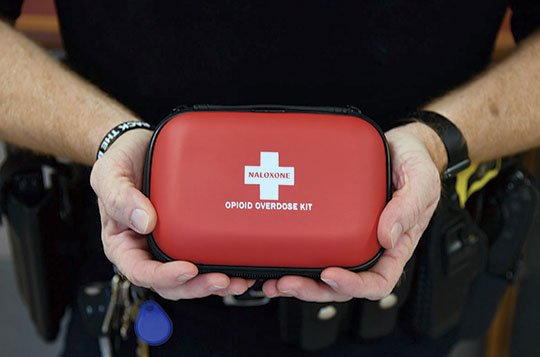Garland County is one of five areas of the state with the highest number of opioid-related fatalities, classifying it as a "high need" area, Criminal Justice Institute Director Dr. Cheryl May said Tuesday, and first responders are now being equipped to treat overdoses.
Each officer at the Hot Springs Police Department and first responders across Garland County are being issued two doses of the opiate blocker Naloxone as part of the Arkansas Prescription Drug and Opioid Overdose Prevention Program for First Responders, which properly trains emergency personnel to safely administer the medication.
Hot Springs police Officer 1st Class Joey Williams said Tuesday that the two-hour training course will be held on Mondays and Fridays until each officer is trained. Officers not only learn how to administer the medication but how it works, and what to expect when the individual who received the medication regains consciousness, Williams said Tuesday.
A grant awarded as part of the Arkansas Prescription Drug and Opioid Overdose Prevention Program for First Responders is providing the resources needed to train and equip first responders in the area with the medication, which comes in the form of a spray that is administered through the nasal cavity.
"Not only is this going to be used to help the general public, but it could save the life of an officer whose come into contact with a lethal dose of an opiate," Williams said.
He explained that some opiates, like Fentanyl, can be absorbed into the skin upon contact. While officers practice precautionary measures and wear gloves during a search, accidents can happen. Williams said something like this has not happened here before but they wanted to be prepared to save a life if it did.
Naloxone, more commonly known as Narcan, is an opioid blocker that temporarily reverses the effects of an overdose when administered. According to the National Institute on Drug Abuse, the medication works by binding to opioid receptors. After it is administered, it quickly restores normal respiration to an individual whose breathing has stopped or slowed due to an overdose.
"We are seeing an increase in the number of calls we receive about opiate-induced overdoses," Williams said.
The Criminal Justice Institute is also working to prevent people from overdosing by reaching out to communities directly. May said community kickoff events help bring awareness to communities and gives them the opportunity to educate the public on what they can do to help end the opioid crisis. An event had not yet been scheduled for Garland County as of Tuesday.
The institute has also developed a curriculum for rehabilitation facilities to use that help prevent those coming out of recovery from returning to substance abuse and overdosing. She said it is all too common to see people overdose shortly after they complete their treatment.
Although there are no measures in place to ensure an individual does not take advantage of the situation, Williams said the police department's main concern is saving lives. After the medication is administered, a first responder will provide the individual with a card listing the available resources and treatment options for their addiction.
According to their policy, the lifesaving drug will be administered each time an officer deems it necessary, despite the number of times an officer sees the same individual in the same situation. Williams said 60 lives have been saved in Arkansas because of the medication.
"Anytime we can save a life it benefits the community. It's just like the tourniquets we carry. We've saved many lives since we started carrying those and we will save even more with this," Williams said.
"As a community, we need to find a solution to the opioid overdoses but in the meantime, our goal is to save lives," he said.
Local on 02/28/2018